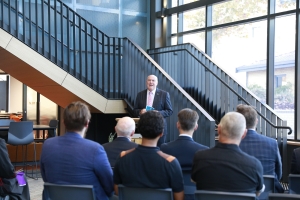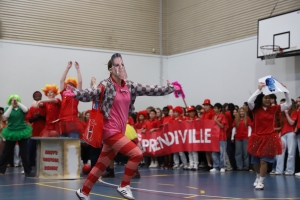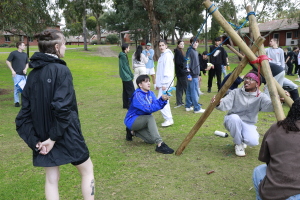Once a term, our College gathers for a whole school Assembly to celebrate the many wonderful activities and events Chisholm has been involved in.
Wednesday’s Assembly had a focus on Reconciliation Week, the ACC Cross Country Team and the College Production of ‘The Wind in the Willows’.
The Theme for Reconciliation Week this year is ‘Be a Voice for Generations’ and we were extremely proud of Year 11 English Literature students Josie McAllister and James Robbins who shared their voice with us in the most courageous of ways. This is what they had to say to our community:
Reconciliation Speech “Be a Voice for Generations”
“Josie: Hello everyone, my name is Josie McAllister, and this is James Robbins and we are here to talk about this week’s theme of “Being a Voice for Generations” and how we can actually achieve this in our day to day life. Obviously, most of us won’t be part of landmark native title cases or make policy that changes thousands of lives, but that doesn’t mean we can’t have an impact and try to be the best allies and people we can be. As Year 11 Literature students, we have the pleasure of studying the play “No Sugar” in class. It’s set on Nyoongar Boodja in the Great Depression and follows the story of the Millimurra and Munday family as they try and fight to survive the racist government policies and systematic oppression Indigenous people were subjected to for years right here in Western Australia.
James: So first of all, why is Reconciliation Week this week? Every year, it falls from the 27th of May to the 3rd of June. These dates are symbolic of landmark events that have been achieved for Indigenous Australians. On the 27th of May 1967, Australia voted 90% in favour of the 1967 Referendum, which counted Aboriginal and Torres Strait Islander people as part of the Commonwealth population, allowing the government to make laws on their behalf. On the 3rd of June 1992, the High Court ruled in favour of Mabo, tearing down the ‘terra nullius’ status that was placed upon Australia and set a new precedent for land rights of Indigenous Australians. This week not only signifies the progress already made, but also the need to continue moving forward and the reminder that this journey of recovery has only just begun.
Josie: On the surface, our nation seems like a perfect example of multiculturalism and equality. However, it’s important to be aware of the structural and social racism ingrained into our society. Indigenous people are massively overrepresented in the prison system. Their life expectancy is far shorter. They are socio-economically disadvantaged in so many ways, and it’s not by accident; the odds are stacked against these people because they were designed to be, in steps ranging from the 1905 Aborigines Act to the redlining of Indigenous communities. This issue is not one of the past; inequality survives and thrives in modern Australia. Racism cannot be reduced to hate crimes in headlines or people saying slurs. It lives in moments of silence and complacency, in commas and full stops – it is a steady drumbeat that permeates so many aspects of our lives. And while that’s very daunting to consider, this week serves also as a reminder that we didn’t get this far based on the actions of one man. We are not alone in this fight – no one is. Real change comes from real solidarity and real solidarity is what happens when we stop making excuses for ourselves and start fighting side by side against the prejudice promoted by our culture.
James: In “No Sugar”, the fight for Indigenous rights is most strongly embodied by outspoken Nyoongar man, Jimmy Munday. Despite Jimmy’s vulnerable position as a Black man in a context dominated by white authority, he refuses to be complacent when subject to racist treatment. He has a shrewd eye, a quick tongue and a mind for politics that scare the white officials, making him a threat to their authority. We should all see Jimmy, in all his foul-mouthed, messy glory, as an example of how to look beyond the dominant narrative, to think critically, and to stand for what’s right regardless of whether it benefits you. How many of us have heard people in class use slurs to describe Aboriginal people? How many of us have seen family members stereotype Aboriginal people as drunks, criminals, good-for-nothings? How many of us have seen this type of racism, insidious in its casual, throwaway tone, and done nothing, stood by and kept quiet and let it continue?
Josie: Folks, I know it’s scary to be the person who stands up. I know it doesn’t feel good to be seen as the sensitive friend, the political one, the one who can’t take a joke. But the unfortunate truth is, it’s just not enough to not be racist. It’s not enough to understand the history, to refrain from the offensive jokes. An example of an unhelpful bystander is the characters of Sister Eileen and the Matron in “No Sugar”. They are unhappy with the treatment of Indigenous Australians at the Moore River Native Settlement, but do not actually take any action against it. In one scene after an argument between the Indigenous inhabitants and white authorities at Moore River, “Sister Eileen remains onstage, not sure which group to follow”. This is what we should try to avoid. There is no point in disagreeing with racism if you aren’t going to do anything about it. Even though Sister Eileen herself was not actively, she failed to actually help with the problem, contributing to the normalisation of racist behaviour.
James: Likewise, if someone stands up to you for making a comment or joke, it is very easy to come up with the response of “but I’m not racist”. If you get called out for making a comment, do not deny it, take it on board and try to improve in the future to not make the same mistake. Consider whether your ego and hurt feelings are worth more than an Indigenous person’s right to be safe and respected. Telling your friend that “it’s just a joke” does not excuse the behaviour either. Joking about intergenerational trauma and an oppressed minority group is no laughing matter. Before making a joke or comment, just think to yourself first if it could be taken as offensive, whether it’s in good fun or if it’s actually taking a dig at someone vulnerable.
Josie: And this message isn’t just to our peers and students. Adults in our society also need to step up and acknowledge how they can improve. If an adult in our community overhears a student saying a slur, they need to respond to this appropriately. Ignoring or turning a blind eye to derogatory comments about Indigenous Australians is not okay. Prejudice, and complacency regarding prejudice, has no place in an institution which is supposed to promote the values of character, learning and compassion, or in a country that’s meant to be “one and free”.
James: In summary, be kind, be courageous and think critically. We aren’t all going to be perfect allies immediately, but we can endeavour to be better every day, to choose the right path even if it might not be the easy one. Thank you for listening and for joining us in trying to be a voice for generations.”
Mrs Belinda Pietropaolo
Deputy Principal – Wellbeing



